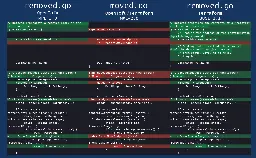I guess if the copyright trolls got their way, there would be no general purpose computing.
Exactly. These kinds of statements are so naive.
Looking at comments outside of Lemmy, I'm appaled by the number of people shocked by this already. Apparently, "just reuse your f-ing bags" is already too hard for a lot of people. We need to start from the easiest.
If the rocket explosion can create a 60 meters wide crater, my guess is it can still at least crack open the fission part and spill the material in the atmosphere.
Subscribed to your RSS this time, thanks!
Hi, are you running multiple nodes to scale on storage throughput? (just curious)
The government of Bhutan is currently holding over $828 million in bitcoin, according to onchain data by Arkham Intelligence.

> "Unlike most governments, Bhutan's BTC does not come from law enforcement asset seizures, but from bitcoin mining operations, which have ramped up dramatically since early 2023," the crypto intelligence firm explained. Crypto intelligence firm Arkham highlighted the Kingdom of Bhutan's bitcoin holdings on social media platform X last week. Bhutan is a small, landlocked kingdom located in the eastern Himalayas, bordered by China to the north and India to the south. The country currently has a population of less than 800,000 people.
We learned last year that Bhutan had been secretly mining bitcoin using its abundant hydroelectric resources since around 2019. The operation, which began when bitcoin was priced at approximately $5,000, aims to harness the country's vast renewable energy reserves to power mining rigs.
Hydroelectricity already accounts for 30% of Bhutan's GDP and powers nearly all of its 800,000 residents. The government claimed last year that mining profits are used to subsidize power and hardware costs. This revelation makes Bhutan one of the few countries globally to run a state-owned bitcoin mine, alongside El Salvador.
At over $800 million in Bitcoin holdings, the reserve accounts for nearly a third of Bhutan's 2022-calculated GDP.
Abstract credit: https://slashdot.org/story/433433
I use BTRFS for the same. Being able to check for and repair silent corruptions is a must (and this is without needing to read the whole drives, only the actual files). I've had a lot of them over the years, including (but not only) because of a cheap USB controller also.
A crackdown on Magis TV has led a judge in Argentina to order Google to remotely uninstall the sideloaded IPTV app from Android devices.
> In instructions to Google, Judge Rossignoli says that the company must “adopt the necessary technical means to immediately uninstall from Android systems that report IP addresses in the territory of the Argentine Republic (which can be verified by the IP addresses assigned to this country), the application named Magis TV.”
> "What was achieved is an unprecedented court order, which is in the process of being analyzed by Google – we understand that they cannot deny it – which is to uninstall, through the Android operating system update, the application on all devices that have an IP address in Argentina,” [prosecuter Alejandro] Musso says.
J'ai oublié Urban Terror (libre), j'y ai beaucoup joué pourtant.
Quelques autres jeux jouables en LAN facilement:
- Half-Life 2: Deathmatch
- Call of Duty 4
- Alerte Rouge 3
- Blur
- Teeworlds (libre)
Every Door
thank you for sharing, definitely the easiest for Android from my research :-)
Note: there is a comparison of editor apps here: https://wiki.openstreetmap.org/wiki/Comparison_of_editors
The feature looks made ugly on purpose though (compared to organic maps where you can just download the whole country or select more precisely what you want)
Or use the open-source Minetest instead?
the Android VLC is absolutely different from the desktop version.
Hi, thanks a lot, I'll sure try them both!
Shazam (or equivalent)
Remove the dot at the end of the link: https://odysee.com/@jopec:7/linus-tech-tips-degoogle-your-life-part-2-adfree-youtube:0
This statement was later retracted. The Engadget article was redacted accordingly.
Unfortunately we are at a point where Cisco Cloudflare and Google are held liable for filesharing-related domains their DNS relays are resolving IPs for...
This one was sponsored by the french government (french language). There is a section for food and one for vegetables. https://impactco2.fr/outils
No, every service provider must remove infringing content when reported. That is not the case on Telegram.
No matter which encoding is used to store data, the hoster is still responsible for it. On mega, the data is encrypted, yet mega is still held responsible for removing content reported by copyright holders (the decryption keys being included in reports).
Carbon in the atmosphere is a major driver of climate change. Now researchers from McGill University have designed a new catalyst for converting carbon dioxide (CO2) into methane—a cleaner source of energy—using tiny bits of copper called nanoclusters. While the traditional method of producing metha...

> Carbon in the atmosphere is a major driver of climate change. Now researchers from McGill University have designed a new catalyst for converting carbon dioxide (CO2) into methane -- a cleaner source of energy -- using tiny bits of copper called nanoclusters. While the traditional method of producing methane from fossil fuels introduces more CO2 into the atmosphere, the new process, electrocatalysis, does not. "On sunny days you can use solar power, or when it's a windy day you can use that wind to produce renewable electricity, but as soon as you produce that electricity you need to use it," says Mahdi Salehi, Ph.D. candidate at the Electrocatalysis Lab at McGill University. "But in our case, we can use that renewable but intermittent electricity to store the energy in chemicals like methane."
> By using copper nanoclusters, says Salehi, carbon dioxide from the atmosphere can be transformed into methane and once the methane is used, any carbon dioxide released can be captured and "recycled" back into methane. This would create a closed "carbon loop" that does not emit new carbon dioxide into the atmosphere. The research, published recently in the journal Applied Catalysis B: Environment and Energy, was enabled by the Canadian Light Source (CLS) at the University of Saskatchewan (USask). The team plans to continue refining their catalyst to make it more efficient and investigate its large-scale, industrial applications. Their hope is that their findings will open new avenues for producing clean, sustainable energy.

Researchers have devised a way to extract energy from the photosynthesis process of algae, according to an announcement from Concordia University.
Suspended in a specialized solution, the algae forms part of a "micro photosynthetic power cell" that can actually generate enough energy to power low-power devices like Internet of Things (IoT) sensors.
> Photosynthesis produces oxygen and electrons. Our model traps the electrons, which allows us to generate electricity," [says Kirankumar Kuruvinashetti, PhD 20, now a Mitacs postdoctoral associate at the University of Calgary.] "So more than being a zero-emission technology, it's a negative carbon emission technology: it absorbs carbon dioxide from the atmosphere and gives you a current. Its only byproduct is water.
> [...] Muthukumaran Packirisamy, professor in the Department of Mechanical, Industrial and Aerospace Engineering and the paper's corresponding author, admits the system is not yet able to compete in power generation with others like photovoltaic cells. The maximum possible terminal voltage of a single micro photosynthetic power cell is only 1.0V. But he believes that, with enough research and development, including artificial intelligence-assisted integration technologies, this technology has the potential to be a viable, affordable and clean power source in the future.
> It also offers significant manufacturing advantages over other systems, he says. "Our system does not use any of the hazardous gases or microfibres needed for the silicon fabrication technology that photovoltaic cells rely on. Furthermore, disposing of silicon computer chips is not easy. We use biocompatible polymers, so the whole system is easily decomposable and very cheap to manufacture.
In the paper the researchers also described it as a âoemicrobial fuel cellâ...
Abstract credit: https://slashdot.org/story/429671
A hacker broke into systems used by Tile, the tracking company, then stole a wealth of customer data and had access to internal company tools.

A hacker has gained access to internal tools used by the location tracking company Tile, including one that processes location data requests for law enforcement, and stolen a large amount of customer data, such as their names, physical addresses, email addresses, and phone numbers, 404 Media reports. From the report:
> The stolen data itself does not include the location of Tile devices, which are small pieces of hardware users attach to their keys or other items to monitor remotely. But it is still a significant breach that shows how tools intended for internal use by company workers can be accessed and then leveraged by hackers to collect sensitive data en masse. It also shows that this type of company, one which tracks peoples' locations, can become a target for hackers. "Basically I had access to everything," the hacker told 404 Media in an online chat. The hacker says they also demanded payment from Tile but did not receive a response.
> Tile sells various tracking devices which can be located through Tile's accompanying app. Life360, another location data focused company, acquired Tile in November 2021. The hacker says they obtained login credentials for a Tile system that they believe belonged to a former Tile employee. One tool specifically says it can be used to "initiate data access, location, or law enforcement requests." Users can then lookup Tile customers by their phone number or another identifier, according to a screenshot of the tool.
Abstract credit: https://slashdot.org/story/429499
The experience of paying for things online is about to feel a lot different in the coming years.

> Starting from 2030, Mastercard will no longer require Europeans to enter their card numbers manually when checking out online -- no matter what platform or device they're using. Mastercard will announce Tuesday in a fireside chat with CNBC that, by 2030, all cards it issues on its network in Europe will be tokenized. In other words, instead of the 16-digit card number we're all accustomed to using for transactions, this will be replaced with a randomly generated "token."
> The firm says it's been working with banks, fintechs, merchants and other partners to phase out manual card entry for e-commerce by 2030 in Europe, in favor of a one-click button across all online platforms. This will ensure that consumers' cards are secure against fraud attempts, Mastercard says. Users won't have to keep entering passwords every time they try to make a payment, as Mastercard is introducing passkeys that replace passwords.
The world's largest solar farm, which sits in the desert in northwestern Xinjiang, is now connected to China's grid.

> The world's largest solar farm, in the desert in northwestern Xinjiang, is now connected to China's grid. The 3.5-gigawatt (GW), 33,000-acre solar farm is outside Urumqi, Xinjiang's capital. The state asset regulator's website cited the Power Construction Corp of China and said it came online on Monday. The solar farm will generate about 6.09 billion kilowatt hours (kWh) of electricity annually. Assuming an EV consumes about 3,000 kWh per year, 6.09 billion kWh could power 2.03 million EVs annually.
> The world's largest solar farm in Xinjiang is part of China's megabase project, a plan to install 455 GW of wind and solar. The megabase projects are sited in sparsely populated, resource-rich areas and send their generated energy to major urban centers, such as on China's eastern seaboard. China now boasts the three largest solar farms in the world by capacity. The Ningxia Tenggeli and Golmud Wutumeiren solar farms, each with a capacity of 3 MW, are already online.
Buterin addressed hot-button issues to the Ethereum community, including MEV, liquid staking, and the high hardware requirements of running nodes.

In a new blog post, Ethereum co-founder Vitalik Buterin has shared his thoughts on three issues core to Ethereum's decentralization: MEV, liquid staking, and the hardware requirements of nodes. The Block reports:
> In his post, published on May 17, Buterin first addresses the issue of MEV, or the financial gain that sophisticated node operators can capture by reordering the transactions within a block. Buterin characterizes the two approaches to MEV as "minimization" (reducing MEV through smart protocol design, such as CowSwap) and "quarantining" (attempting to reduce or eliminate MEV altogether through in-protocol techniques). While MEV quarantining seems like an alluring option, Buterin notes that the prospect comes with some centralization risks. "If builders have the power to exclude transactions from a block entirely, there are attacks that can quite easily arise," Buterin noted. However, Buterin championed the builders working on MEV quarantining through concepts like transaction inclusion lists, which "take away the builder's ability to push transactions out of the block entirely." "I think ideas in this direction - really pushing the quarantine box to be as small as possible - are really interesting, and I'm in favor of going in that direction," Buterin concluded.
> Buterin also addressed the relatively low number of solo Ethereum stakers, as most stakers choose to stake with a staking provider, either a centralized offering like Coinbase or a decentralized offering like Lido or RocketPool, given the complexity, hardware requirement, and 32 eth minimum needed to operate an Ethereum node solo. While Buterin acknowledges the progress being made to reduce the cost and complexity around running a solo node, he also noted "once again there is more that we could do," perhaps through reducing the time to withdraw staked ether or reducing the 32 eth minimum requirement to become a solo staker. "Incorrect answers could lead Ethereum down a path of centralization and 're-creating the traditional financial system with extra steps'; correct answers could create a shining example of a successful ecosystem with a wide and diverse set of solo stakers and highly decentralized staking pools," Buterin wrote. [...]
> Buterin finished his post by imploring the Ethereum ecosystem to tackle the hard questions rather than shy away from them. "...We should have deep respect for the properties that make Ethereum unique, and continue to work to maintain and improve on those properties as Ethereum scales," Buterin wrote. Buterin added today, in a post on X, that he was pleased to see civil debate among community members. "I'm really proud that ethereum does not have any culture of trying to prevent people from speaking their minds, even when they have very negative feelings toward major things in the protocol or ecosystem. Some wave the ideal of 'open discourse' as a flag, some take it seriously," Buterin wrote.
Abstract credit: https://slashdot.org/story/428637
The way people pay and get paid has changed more in the past five years than in the last 50. Consumers have evolved, adapting to new payment experienc
Visa is rolling out new technology that will allow the payments giant to share more information about customers' preferences [non-paywalled source] based on their shopping history with retailers as it seeks to remain a top player in the competitive e-commerce space. From a report:
> The data will be shared via the payments giant's proprietary "tokens," which provide an added layer of security between a consumer's bank information and a merchant. Shopping inclinations and other information based on past transactions -- such as preferred categories, like movies or golf -- will be shared via token with retailers with the consent of consumers.
> "It's almost entirely blind to almost all consumers," Visa Chief Executive Officer Ryan McInerney said in an interview of the company's token technology. "They just know their payments work better." The sharing of shopping data via token is one of a handful of innovations Visa unveiled at a conference in San Francisco, where it's based. Visa, one of the largest e-commerce technology companies in the world, is finding itself increasingly fending off competitors seeking larger slices of the fees merchants must pay to carry out consumer transactions.
Abstract credit: https://slashdot.org/story/428471
The space agency is investing in the development of a propulsion system that uses nuclear power to create plasma bursts.

Last week, NASA announced it is working with a technology development company on a new propulsion system that could transport humans to Mars in only two months -- down from the current nine month journey required to reach the Red Planet. Gizmodo reports:
> NASA's Innovative Advanced Concepts (NIAC) program recently selected six promising projects for additional funding and development, allowing them to graduate to the second stage of development. The new "science fiction-like concepts," as described by John Nelson, NIAC program executive at NASA, include a lunar railway system and fluid-based telescopes, as well as a pulsed plasma rocket.
> The potentially groundbreaking propulsion system is being developed by Arizona-based Howe Industries. To reach high velocities within a shorter period of time, the pulsed plasma rocket would use nuclear fission -- the release of energy from atoms splitting apart -- to generate packets of plasma for thrust. It would essentially produce a controlled jet of plasma to help propel the rocket through space. Using the new propulsion system, and in terms of thrust, the rocket could potentially generate up to 22,481 pounds of force (100,000 Newtons) with a specific impulse (Isp) of 5,000 seconds, for remarkably high fuel efficiency. [...]
> The pulsed plasma rocket would also be capable of carrying much heavier spacecraft, which can be then equipped with shielding against galactic cosmic rays for the crew on board. Phase 2 of NIAC is focused on assessing the neutronics of the system (how the motion of the spacecraft interacts with the plasma), designing the spacecraft, power system, and necessary subsystems, analyzing the magnetic nozzle capabilities, and determining trajectories and benefits of the pulsed plasma rocket, according to NASA.
Abstract credit: https://slashdot.org/story/428225
We need to talk about this problem. Should Mastodon step up?

The blog Its FOSS has 15,000 followers for its Mastodon account — which they think is causing problems:
> When you share a link on Mastodon, a link preview is generated for it, right? With Mastodon being a federated platform (a part of the Fediverse), the request to generate a link preview is not generated by just one Mastodon instance. There are many instances connected to it who also initiate requests for the content almost immediately. And, this "fediverse effect" increases the load on the website's server in a big way.
> Sure, some websites may not get overwhelmed with the requests, but Mastodon does generate numerous hits, increasing the load on the server. Especially, if the link reaches a profile with more followers (and a broader network of instances)... We tried it on our Mastodon profile, and every time we shared a link, we were able to successfully make our website unresponsive or slow to load.
It's Foss blog says they found three GitHub issues about the same problem — one from 2017, and two more from 2023. And other blogs also reported the same issue over a year ago — including software developer Michael Nordmeyer and legendary Netscape programmer Jamie Zawinski.
And back in 2022, security engineer Chris Partridge wrote:
> [A] single roughly ~3KB POST to Mastodon caused servers to pull a bit of HTML and... an image. In total, 114.7 MB of data was requested from my site in just under five minutes — making for a traffic amplification of 36704:1. [Not counting the image.]
Its Foss reports Mastodon's official position that the issue has been "moved as a milestone for a future 4.4.0 release. As things stand now, the 4.4.0 release could take a year or more (who knows?)."
They also state their opinion that the issue "should have been prioritized for a faster fix... Don't you think as a community-powered, open-source project, it should be possible to attend to a long-standing bug, as serious as this one?"
Abstract credit: https://slashdot.org/story/428030
On April 3rd, we received a Cease and Desist letter from HashiCorp regarding our implementation of the "removed" block in OpenTofu, claiming copyright infringement on the part of one of our core developers. We were also made aware of an article posted that same day with the same accusations. We have...

cross-posted from: https://lemmy.smeargle.fans/post/145396
Canadian legislators proposed 19,600 amendments—almost certainly AI-generated—to a bill in an attempt to delay its adoption.
Calpine’s billion-dollar, 680-megawatt project in Menifee will be one of the biggest batteries in the U.S. when it comes online this summer.

Meanwhile, in Southern California, nonprofit news site Canary Media reports that an old gas combustion plant is being replaced by a "power bank" named Nova.
It's expected to store "more electricity than all but one battery plant currently operating in the U.S."
> The billion-dollar project, with 680 megawatts and 2,720 megawatt-hours, will help California shift its nation-leading solar generation into the critical evening and nighttime hours, bolstering the grid against the heat waves that have pushed it to the brink multiple times in recent years... The town of Menifee gets to move on from the power plant exhaust that used to join the smog flowing from Los Angeles... And the grid gets a bunch more clean capacity that can, ideally, displace fossil fuels...
> Moreover, [the power bank] represents Calpine's grand arrival in the energy storage market, after years operating one of the biggest independent gas power plant fleets in the country alongside Vistra and NRG... Federal analysts predict 2024 will be the biggest-ever year for grid battery installations across the U.S., and they highlighted Calpine's project as one of the single largest projects. The 620 megawatts the company plans to energize this year represent more than 4% of the industry's total expected new additions.
> Many of these new grid batteries will be built in California, which needs all the dispatchable power it can get to meet demand when its massive solar fleet stops producing, and to keep pace with the electrification of vehicles and buildings. The Menifee Power Bank, and the other gigawatts worth of storage expected to come online in the state this year, will deliver much-needed reinforcement.
The company says it's planning "a portfolio" of 2,000 megawatts of California battery capacity.
But even this 680-megawatt project consists of 1,096 total battery containers holding 26,304 battery modules (or a total of 3 million cells), "all manufactured by Chinese battery powerhouse BYD, according to Robert Stuart, an electrical project manager with Calpine. That's enough electricity to supply 680,000 homes for four hours before it runs out."
> What's remarkable is just how quickly the project came together. Construction began last August, and is expected to hit 510 megawatts of fully operational capacity over the course of this summer, even as installation continues on other parts of the plant. Erecting a conventional gas plant of comparable scale would have taken three or four years of construction labor, due to the complexity of the systems and the many different trades required for it, Stuart told Canary Media... That speed and flexibility makes batteries a crucial solution as utilities across the nation grapple with a spike in expected electricity demand unlike anything seen in the last few decades.
The article notes a 2013 Caifornia policy mandating battery storage for its utility companies, which "kicked off a decade-long project to will an energy storage market into existence through methodical policies and regulations, and the knock-on effects of building the nation's foremost solar fleet."
> Those energy storage policies succeeded in jumpstarting the modern grid battery market: California leads the nation with more than 7 gigawatts of batteries installed as of last year (though Texas is poised to overtake California in battery installations this year, on the back of no particular policy effort but a general openness to building energy projects)... California's interlocking climate regulations effectively rule out new gas construction. The state's energy roadmap instead calls for massive expansion of battery capacity to shift the ample amounts of solar generation into the evening peaks.
"These trends, along with the falling price of batteries and maturing business model for storage, nudged Calpine to get into the battery business, too."
Abstract credit: https://slashdot.org/story/427236
Hello, I noticed some of my early posts (less than a year ago) disappeared. I did not receive notification about the removal. Hence I suppose it could be due to one of those:
- the instance hosting the community got defederated
- the community I posted in was removed
- there is some automatic cleanup job of old posts on Lemmy.ml
This is not mentioned in Lemmy.ml's presentation section. Does this instance implement pruning? (if so; what is the retention duration?) Is it possible to check the retention policy of a Lemmy instance?
Researchers have successfully transformed CO2 into methanol by shining sunlight on single atoms of copper deposited on a light-activated material, a discovery that paves the way for creating new green fuels. An international team of researchers from the University of Nottingham's School of Chemis

"Researchers have successfully transformed CO2 into methanol," reports SciTechDaily, "by shining sunlight on single atoms of copper deposited on a light-activated material, a discovery that paves the way for creating new green fuels."
> Tara LeMercier, a PhD student who carried out the experimental work at the University of Nottingham, School of Chemistry, said: "We measured the current generated by light and used it as a criterion to judge the quality of the catalyst. Even without copper, the new form of carbon nitride is 44 times more active than traditional carbon nitride. However, to our surprise, the addition of only 1 mg of copper per 1 g of carbon nitride quadrupled this efficiency. Most importantly the selectivity changed from methane, another greenhouse gas, to methanol, a valuable green fuel."
> Professor Andrei Khlobystov, School of Chemistry, University of Nottingham, said: "Carbon dioxide valorization holds the key for achieving the net-zero ambition of the UK. It is vitally important to ensure the sustainability of our catalyst materials for this important reaction. A big advantage of the new catalyst is that it consists of sustainable elements — carbon, nitrogen, and copper — all highly abundant on our planet." This invention represents a significant step towards a deep understanding of photocatalytic materials in CO2 conversion. It opens a pathway for creating highly selective and tuneable catalysts where the desired product could be dialed up by controlling the catalyst at the nanoscale.
Abstract credit: https://science.slashdot.org/story/24/03/30/049239/researchers-develop-new-material-that-converts-co2-into-methanol-using-sunlight
Two years into office, President Donald Trump authorized the Central Intelligence Agency to launch a clandestine campaign on Chinese social media aimed at turning public opinion in China against its government, according to former U.S. officials with direct knowledge of the highly classified operation. Three former officials told Reuters that the CIA created a small team of operatives who used bogus internet identities to spread negative narratives about Xi Jinping's government while leaking disparaging intelligence to overseas news outlets. The effort, which began in 2019, has not been previously reported.
The CIA team promoted allegations that members of the ruling Communist Party were hiding ill-gotten money overseas and slammed as corrupt and wasteful China's Belt and Road Initiative, which provides financing for infrastructure projects in the developing world, the sources told Reuters. Although the U.S. officials declined to provide specific details of these operations, they said the disparaging narratives were based in fact despite being secretly released by intelligence operatives under false cover. The efforts within China were intended to foment paranoia among top leaders there, forcing its government to expend resources chasing intrusions into Beijing's tightly controlled internet, two former officials said. "We wanted them chasing ghosts," one of these former officials said. [...]
The CIA operation came in response to years of aggressive covert efforts by China aimed at increasing its global influence, the sources said. During his presidency, Trump pushed a tougher response to China than had his predecessors. The CIA's campaign signaled a return to methods that marked Washington's struggle with the former Soviet Union. "The Cold War is back," said Tim Weiner, author of a book on the history of political warfare. Reuters was unable to determine the impact of the secret operations or whether the administration of President Joe Biden has maintained the CIA program.
Abstract credit: https://yro.slashdot.org/story/24/03/14/2315243/cia-used-chinese-social-media-in-covert-influence-operation-against-xi-jinpings-government
Seagate plans to ship HAMR HDDs for cloud customers in Q1 2024.

Seagate this week unveiled the industry's first hard disk drive platform that uses heat-assisted media recording (HAMR). Tom's Hardware: > The new Mozaic 3+ platform relies on several all-new technologies, including new media, new write and read heads, and a brand-new controller. The platform will be used for Seagate's upcoming Exos hard drives for cloud datacenters with a 30TB capacity and higher. Heat-assisted magnetic recording is meant to radically increase areal recording density of magnetic media by making writes while the recording region is briefly heated to a point where its magnetic coercivity drops significantly.
> Seagate's Mozaic 3+ uses 10 glass disks with a magnetic layer consisting of an iron-platinum superlattice structure that ensures both longevity and smaller media grain size compared to typical HDD platters. To record the media, the platform uses a plasmonic writer sub-system with a vertically integrated nanophotonic laser that heats the media before writing. Because individual grains are so small with the new media, their individual magnetic signatures are lower, whereas magnetic inter-track interference (ITI) effect is somewhat higher. As a result, Seagate had to introduce its new Gen 7 Spintronic Reader, which features the "world's smallest and most sensitive magnetic field reading sensors," according to the company. Because Seagate's new Mozaic 3+ platform deals with new media with a very small grain size, an all-new writer, and a reader that features multiple tiny magnetic field readers, it also requires a lot of compute horsepower to orchestrate the drive's work. Therefore, Seagate has equipped with Mozaic 3+ platform with an all-new controller made on a 12nm fabrication process.
Abstract credit: https://hardware.slashdot.org/story/24/01/19/1149214/30tb-hard-drives-are-nearly-here
Both China and the U.S. have called for a watermarking standard for AI-generated video, but neither country has addressed text-based content.

"To prevent disinformation from eroding democratic values worldwide, the U.S. must establish a global watermarking standard for text-based AI-generated content," writes retired U.S. Army Col. Joe Buccino in an opinion piece for The Hill. While President Biden's October executive order requires watermarking of AI-derived video and imagery, it offers no watermarking requirement for text-based content. "Text-based AI represents the greatest danger to election misinformation, as it can respond in real-time, creating the illusion of a real-time social media exchange," writes Buccino. "Chatbots armed with large language models trained with reams of data represent a catastrophic risk to the integrity of elections and democratic norms."
Joe Buccino is a retired U.S. Army colonel who serves as an A.I. research analyst with the U.S. Department of Defense Defense Innovation Board. He served as U.S. Central Command communications director from 2021 until September 2023. Here's an excerpt from his report:
> Watermarking text-based AI content involves embedding unique, identifiable information -- a digital signature documenting the AI model used and the generation date -- into the metadata generated text to indicate its artificial origin. Detecting this digital signature requires specialized software, which, when integrated into platforms where AI-generated text is common, enables the automatic identification and flagging of such content. This process gets complicated in instances where AI-generated text is manipulated slightly by the user. For example, a high school student may make minor modifications to a homework essay created through Chat-GPT4. These modifications may drop the digital signature from the document. However, that kind of scenario is not of great concern in the most troubling cases, where chatbots are let loose in massive numbers to accomplish their programmed tasks. Disinformation campaigns require such a large volume of them that it is no longer feasible to modify their output once released.
> The U.S. should create a standard digital signature for text, then partner with the EU and China to lead the world in adopting this standard. Once such a global standard is established, the next step will follow -- social media platforms adopting the metadata recognition software and publicly flagging AI-generated text. Social media giants are sure to respond to international pressure on this issue. The call for a global watermarking standard must navigate diverse international perspectives and regulatory frameworks. A global standard for watermarking AI-generated text ahead of 2024's elections is ambitious -- an undertaking that encompasses diplomatic and legislative complexities as well as technical challenges. A foundational step would involve the U.S. publicly accepting and advocating for a standard of marking and detection. This must be followed by a global campaign to raise awareness about the implications of AI-generated disinformation, involving educational initiatives and collaborations with the giant tech companies and social media platforms.
> In 2024, generative AI and democratic elections are set to collide. Establishing a global watermarking standard for text-based generative AI content represents a commitment to upholding the integrity of democratic institutions. The U.S. has the opportunity to lead this initiative, setting a precedent for responsible AI use worldwide. The successful implementation of such a standard, coupled with the adoption of detection technologies by social media platforms, would represent a significant stride towards preserving the authenticity and trustworthiness of democratic norms.
Exerp credit: https://slashdot.org/story/423285
Police confiscate ‘illegal income’ of developer deemed to have used ‘unauthorised channels’ to connect to international networks

> A programmer in northern China has been ordered to pay more than 1 million yuan to the authorities for using a virtual private network (VPN), in what is thought to be the most severe individual financial penalty ever issued for circumventing China's "great firewall." The programmer, surnamed Ma, was issued with a penalty notice by the public security bureau of Chengde, a city in Hebei province, on August 18. The notice said Ma had used "unauthorised channels" to connect to international networks to work for a Turkish company. The police confiscated the 1.058m yuan ($145,092) Ma had earned as a software developer between September 2019 and November 2022, describing it as "illegal income," as well as fining him 200 yuan ($27).
Charlie Smith (a pseudonym), the co-founder of GreatFire.org, a website that tracks internet censorship in China, said: "Even if this decision is overturned in court, a message has been sent and damage has been done. Is doing business outside of China now subject to penalties?"
Abstract credit: https://slashdot.org/story/420019
Also on Mastodon: @pedroapero@mastodon.top
Want to send me a tip? XMR:89oiUKyACFZ655sTikh42RF8wpd46EQDmbTQUQiHHRWFEatjp5xxj4tZBhMMfjC4X45qvq4EdEGXkBsdxT1kP9xyVia8mPD